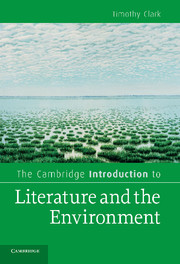Book contents
- Frontmatter
- Contents
- List of illustrations
- Preface
- Acknowledgements
- Introduction
- Romantic and anti-romantic
- The boundaries of the political
- Chapter 7 Thinking like a mountain?
- Chapter 8 Environmental justice and the move ‘beyond nature writing’
- Chapter 9 Two readings
- Chapter 10 Liberalism and green moralism
- Chapter 11 Ecofeminism
- Chapter 12 ‘Post-colonial’ ecojustice
- Chapter 13 Questions of scale
- Science and the struggle for intellectual authority
- The animal mirror
- Notes
- Further reading
- Index
- Cambridge Introductions to …
Chapter 10 - Liberalism and green moralism
Published online by Cambridge University Press: 05 June 2012
- Frontmatter
- Contents
- List of illustrations
- Preface
- Acknowledgements
- Introduction
- Romantic and anti-romantic
- The boundaries of the political
- Chapter 7 Thinking like a mountain?
- Chapter 8 Environmental justice and the move ‘beyond nature writing’
- Chapter 9 Two readings
- Chapter 10 Liberalism and green moralism
- Chapter 11 Ecofeminism
- Chapter 12 ‘Post-colonial’ ecojustice
- Chapter 13 Questions of scale
- Science and the struggle for intellectual authority
- The animal mirror
- Notes
- Further reading
- Index
- Cambridge Introductions to …
Summary
It might seem strange at first that an introduction to literature and the environment should have a chapter on liberalism, a topic only sometimes discussed in green literary criticism, though prominent in other discussions of environmentalism. Liberalism, in the broad sense of that political tradition focussed on individual liberty as the supreme aim of politics, remains nevertheless a dominant political context for ecocriticism and marks it decisively.
Kerridge sets out one of the basic problems:
unlike feminism, with which it otherwise has points in common, environmentalism has difficulty in being a politics of personal liberation or social mobility…environmentalism has a political weakness in comparison with feminism: it is much harder for environmentalists to make the connection between global threats and individual lives.
Modes of reading geared to the affirmation of individual liberty and the policing of individual rights and their infringement have become the bread and butter of mainstream literary criticism. Ecocritics largely see themselves as part of this progressive enlightenment tradition, with its aims of human self-liberation through the overcoming of prejudice and injustice. This is why the turn to issues of ecojustice proved so easy to make. It is often in fact the values of a progressive liberalism that form the unacknowledged reference when green critics endorse alternative religious traditions or new age ideas.
- Type
- Chapter
- Information
- The Cambridge Introduction to Literature and the Environment , pp. 102 - 110Publisher: Cambridge University PressPrint publication year: 2011
- 1
- Cited by

